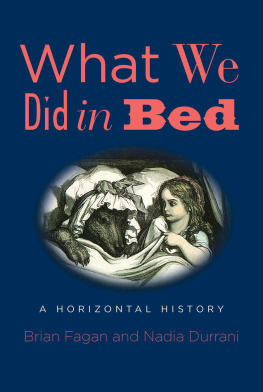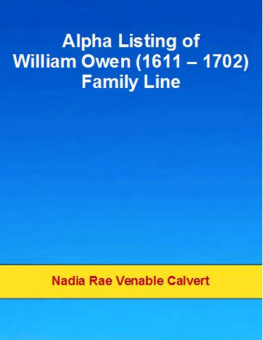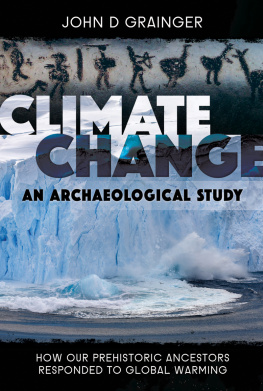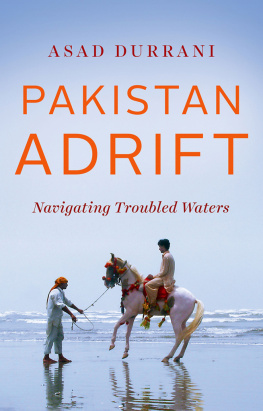Nadia Durrani - Climate chaos : lessons on survival from our ancestors
Here you can read online Nadia Durrani - Climate chaos : lessons on survival from our ancestors full text of the book (entire story) in english for free. Download pdf and epub, get meaning, cover and reviews about this ebook. year: 2021, genre: Romance novel. Description of the work, (preface) as well as reviews are available. Best literature library LitArk.com created for fans of good reading and offers a wide selection of genres:
Romance novel
Science fiction
Adventure
Detective
Science
History
Home and family
Prose
Art
Politics
Computer
Non-fiction
Religion
Business
Children
Humor
Choose a favorite category and find really read worthwhile books. Enjoy immersion in the world of imagination, feel the emotions of the characters or learn something new for yourself, make an fascinating discovery.

- Book:Climate chaos : lessons on survival from our ancestors
- Author:
- Genre:
- Year:2021
- Rating:4 / 5
- Favourites:Add to favourites
- Your mark:
- 80
- 1
- 2
- 3
- 4
- 5
Climate chaos : lessons on survival from our ancestors: summary, description and annotation
We offer to read an annotation, description, summary or preface (depends on what the author of the book "Climate chaos : lessons on survival from our ancestors" wrote himself). If you haven't found the necessary information about the book — write in the comments, we will try to find it.
Climate chaos : lessons on survival from our ancestors — read online for free the complete book (whole text) full work
Below is the text of the book, divided by pages. System saving the place of the last page read, allows you to conveniently read the book "Climate chaos : lessons on survival from our ancestors" online for free, without having to search again every time where you left off. Put a bookmark, and you can go to the page where you finished reading at any time.
Font size:
Interval:
Bookmark:
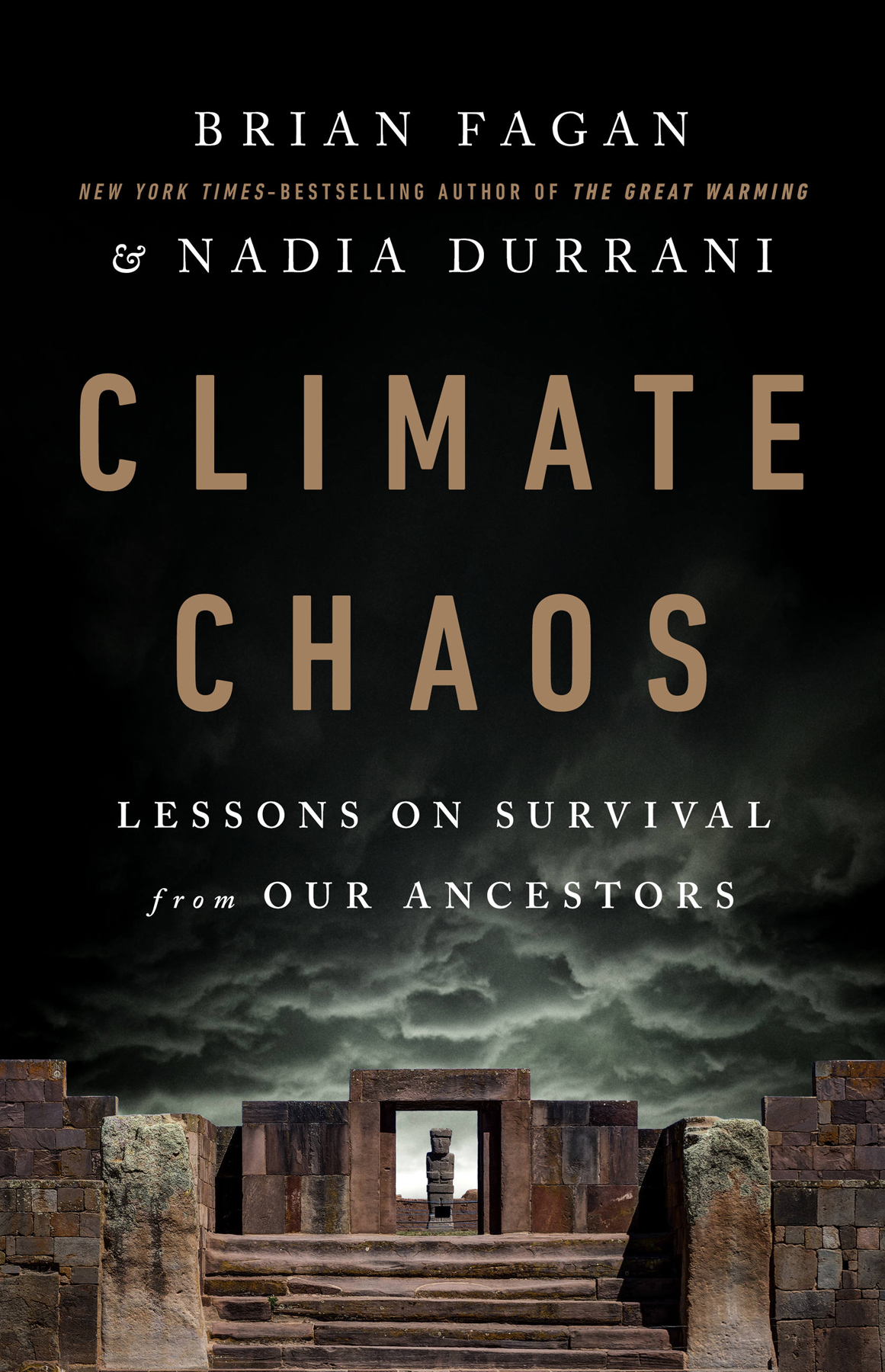
Copyright 2021 by Brian Fagan and Nadia Durrani
Cover design by Pete Garceau
Cover image iStock / Getty Images
Cover copyright 2021 by Hachette Book Group, Inc.
Hachette Book Group supports the right to free expression and the value of copyright. The purpose of copyright is to encourage writers and artists to produce the creative works that enrich our culture.
The scanning, uploading, and distribution of this book without permission is a theft of the authors intellectual property. If you would like permission to use material from the book (other than for review purposes), please contact permissions@hbgusa.com. Thank you for your support of the authors rights.
PublicAffairs
Hachette Book Group
1290 Avenue of the Americas, New York, NY 10104
www.publicaffairsbooks.com
@Public_Affairs
First Edition: September 2021
Published by PublicAffairs, an imprint of Perseus Books, LLC, a subsidiary of Hachette Book Group, Inc. The PublicAffairs name and logo is a trademark of the Hachette Book Group.
The Hachette Speakers Bureau provides a wide range of authors for speaking events. To find out more, go to www.hachettespeakersbureau.com or call (866) 376-6591.
The publisher is not responsible for websites (or their content) that are not owned by the publisher.
Library of Congress Cataloging-in-Publication Data
Names: Fagan, Brian M., author. | Durrani, Nadia, author.
Title: Climate chaos: lessons on survival from our ancestors / Brian Fagan and Nadia Durrani.
Description: First edition. | New York: PublicAffairs, 2021. | Includes bibliographical references and index.
Identifiers: LCCN 2021016383 | ISBN 9781541750876 (hardcover) | ISBN 9781541750883 (ebook)
Subjects: LCSH: PaleoclimatoryResearch. | Climatic changesHistory.
Classification: LCC QC884.2.C5 F34 2021 | DDC 304.2/5dc23
LC record available at https://lccn.loc.gov/2021016383
ISBNs: 9781541750876 (hardcover); 9781541750883 (ebook)
E3-20210809-JV-NF-ORI
To Michael McCormick
With thanks for encouragement and sage advice.
He is a paragon of the dawning age
of consilient interdisciplinary inquiry of the
human and natural past.
Explore book giveaways, sneak peeks, deals, and more.

Nekhen, Upper Egypt, c. 2180 BCE. Ankhtifi was a very powerful man in an Egypt plagued by dissent and famine. He was a nomarch, a provincial governor, at least theoretically subordinate to the pharaoh but in fact one of the most influential men in the state. He walked in formal procession to the sun god Amuns temple, surrounded by well-armed guards. He wore white, his wig in perfect order, necklaces of semiprecious stones at his neck. The great lord looked neither left nor right in the bright sunlight, seemingly ignoring the silent, hungry crowds gathered along the route. He carried his long staff of office and a ceremonial mace, a richly decorated, knotted belt around his waist. The soldiers eyes flickered back and forth, alert for spears and knives. The people had empty stomachs; the rations they received were meager; stealing and petty violence were on the rise. A horn sounded as the great man entered the temple with its dark shrine where the sun god awaited. Silence fell as the nomarch made offerings to Amun and prayed for a plentiful flood, for relief from recent years.
It had been thus for several generations, longer than many local farmers could recall. Down by the Nile, the priests had been watching the flood for days, marking its rise against steps in the bank. Some of them shook their heads, for they sensed that the flood was slowing. But they were hopeful, for they believed that the gods controlled the river and the floods that nourished it far upstream. Ankhtifi was a strong, forthright leader who ruled his people with an iron hand. He rationed food, controlled peoples movements, and closed his provinces borders, but this able and forceful man knew in his heart of hearts that he and his people were at the mercy of the gods. It had always been so.
Ankhtifi and his contemporaries lived in an Egyptian world encompassed by the Nile. He lived in troubled times, beset by poor river floods and hunger, which threatened the states existence, not so different from our world today. The climatic stakes of our time are global and of unprecedented severity. As numerous people, from politicians and religious leaders to grassroot activists and scientists, have proclaimed, humanitys future is at stake. Many experts remind us that we have one more chance to correct humankinds course, to avoid potential extinction. This is true, but weve largely forgotten the vast legacy surrounding humans and climate change that weve inherited.
Theres a common assumption that the human experience with ancient climatic shifts is irrelevant to todays industrialized world. Nothing could be further from the truth. We dont necessarily learn from the past directly. But through years of archeological study, weve learned more about ourselves, as individuals and as a society. And weve also come to understand a great deal more about the challenges of adapting to climate change over long periods of time.
Unfortunately, our promiscuous dependence on carbon-generating fossil fuels continues virtually unabated. The catastrophic wildfires that ravaged the American West in 2020 offer shattering proof of the menace posed by human-caused climate change. Persistent warming, a higher frequency of hurricanes and other extreme weather events, rising sea levels, unprecedented droughts, and record-breaking temperatures: the list of threats seems unending. A tidal wave of basic scientific research has established beyond all doubt that we humans are the cause of high carbon levels in the atmosphere and global warming.
Despite this research, platoons of climate change deniers, often funded by the very industries they are defending, proclaim that global warming, sea level rises, and the increasingly frequent extreme climatic events of today are part of the natural cycle of things. The skeptics spend vast sums of money on elaborate disinformation campaigns, even on conspiracy theories denigrating science. They are so convincing that a significant percentage of US citizens think they speak the truth. But on what basis do they draw such conclusions? Our concern here is with the dramatic advances in our knowledge of how humans have dealt with climate change over the past 30,000 years. How did people cope with such uncertainties of weather and climate? Which of their measures worked and which failed? What lessons can we take from their lives to inform ourselves and our future decisions? The claims of climate change deniers have no place in these discussions.
Even a quarter century ago, it would have been impossible to tell this story. Among all the historical sciences, archeology is unique in its ability to study human societies as they develop and change over enormously long periods. Archeologists historical perspective extends back much further than the Declaration of Independence or the Roman Empire. The 5,100 years or so of written history are but a blink of an eye in terms of the 6 million years of human experience. In these pages, we focus our historical telescope on people and climate change in a segment of this long chronicle, the past 30,000 years from the height of the last Ice Age to modern times, a period of remarkable transformation in human society. A major revolution in paleoclimatology, the study of ancient climate, has subsequently changed our knowledge of ancient climates. Much of this research is highly specialized, technical, and very fast moving, with important research papers appearing weekly. To master it is a daunting task, which appeals to few laypeople. Rather than submerge our narrative in a morass of scientific detail, weve written what we call a prolegomenon on the climatology, which appears on p. 1. This attempts to provide an overview of major climatic phenomena (for example, El Nios and the North Atlantic Oscillation) and the most widely used methods for studying ancient climate either directly or using what are called proxiesmore indirect approaches. We felt it best to provide a separate discussion of these subjects, lest we divert from the major thrust of our narrative, which is predominantly archeological and historical.
Font size:
Interval:
Bookmark:
Similar books «Climate chaos : lessons on survival from our ancestors»
Look at similar books to Climate chaos : lessons on survival from our ancestors. We have selected literature similar in name and meaning in the hope of providing readers with more options to find new, interesting, not yet read works.
Discussion, reviews of the book Climate chaos : lessons on survival from our ancestors and just readers' own opinions. Leave your comments, write what you think about the work, its meaning or the main characters. Specify what exactly you liked and what you didn't like, and why you think so.

